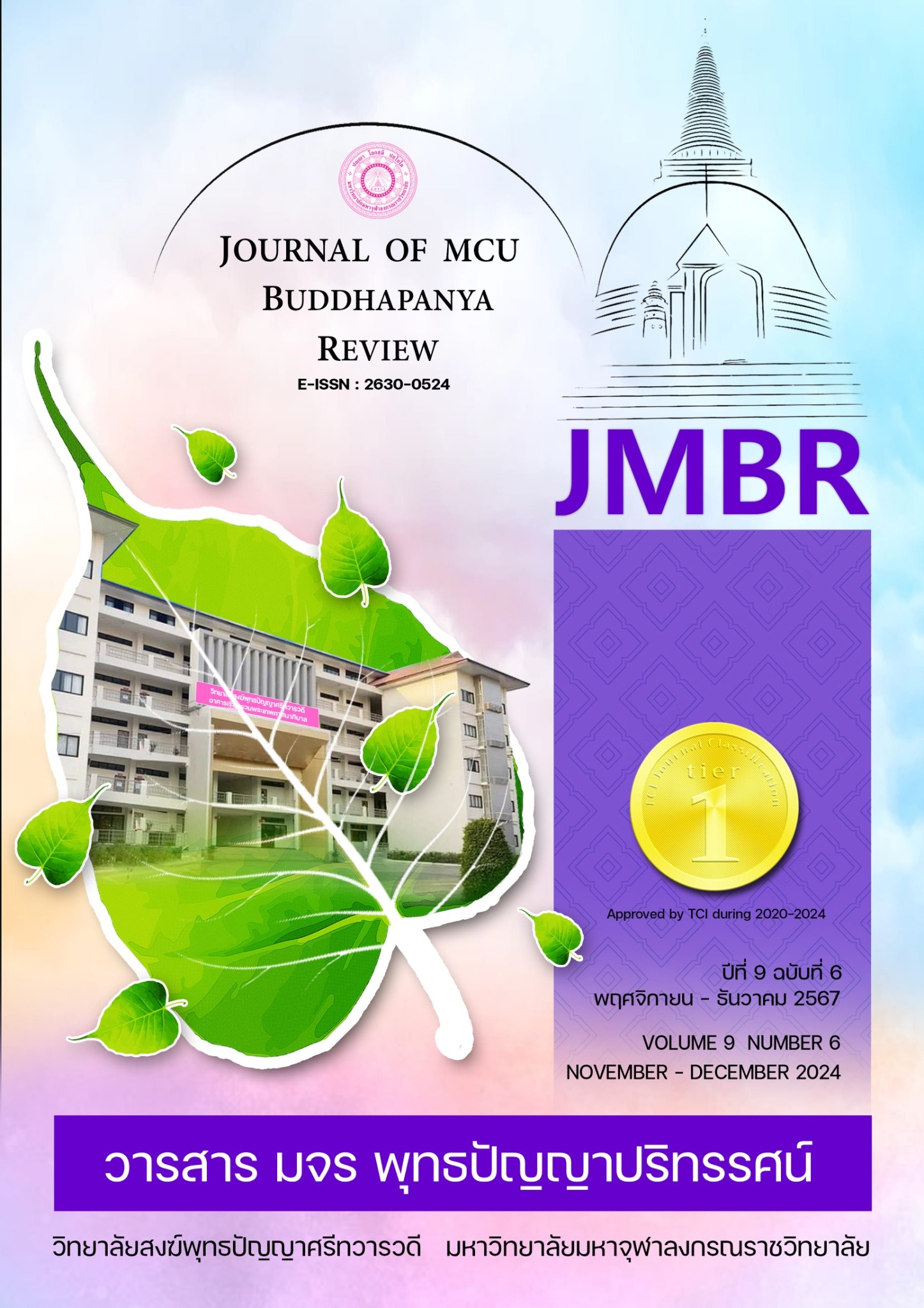กระบวนการเสริมสร้างศาสนิกสัมพันธ์เพื่อความสมานฉันท์ ของผู้นำศาสนาในจังหวัดนครปฐมด้วยจิตตปัญญาศึกษา
คำสำคัญ:
ศาสนิกสัมพันธ์, ความสมานฉันท์, ผู้นำศาสนา, จิตตปัญญาศึกษาบทคัดย่อ
การวิจัยนี้มีวัตถุประสงค์เพื่อศึกษาสภาพปัจจุบันและปัญหาของความสัมพันธ์ทางศาสนาในจังหวัดนครปฐม สร้างคู่มือการเสริมสร้างศาสนิกสัมพันธ์เพื่อความสมานฉันท์ของผู้นำศาสนาด้วยกระบวนการจิตตปัญญาศึกษา และประเมินคู่มือเสริมสร้างศาสนิกสัมพันธ์เพื่อความสมานฉันท์ของผู้นำศาสนาในจังหวัดนครปฐมด้วยกระบวนการจิตตปัญญาศึกษา เก็บข้อมูลโดยใช้แนวทางแบบผสมผสานวิธี ประกอบด้วยการศึกษาเอกสาร การสัมภาษณ์ ประเมินประสิทธิภาพคู่มือ ฯลฯ ประเมินผลกการใช้คู่มือ ฯลฯ จากกลุ่มตัวอย่างคือ ผู้นำศาสนา ผู้บริหารองค์กรศาสนิกสัมพันธ์ ผู้ทรงคุณวุฒิด้านศาสนิกสัมพันธ์ และด้านจิตตปัญญาศึกษา ผู้เข้าร่วมทดลองการใช้คู่มือ ฯลฯ
ผลการวิจัยพบว่า จังหวัดนครปฐมเป็นสังคมพหุนิยมทางศาสนามีองค์พระปฐมเจดีย์เป็นศูนย์กลางของความสัมพันธ์ทางศาสนา ทำให้ภูมิทัศน์ทางศาสนาของจังหวัดนครปฐมเอื้อต่อการจัดกิจกรรมเสริมสร้างศาสนิกสัมพันธ์เพื่อความสมานฉันท์ของผู้นำศาสนาโดยเฉพาะเส้นทางศาสนิกสัมพันธ์รอบอาณาบริเวณองค์พระปฐมเจดีย์ ด้านความสัมพันธ์ของผู้นำศาสนา มีลักษณะต่างคนต่างอยู่ ไม่มีกิจกรรมสร้างความคุ้นเคยสนิทสนมต่อกัน
ผลการสร้างคู่มือ ฯลฯ มีองค์ประกอบของคู่มือดังนี้ 1) แนวคิดสำคัญเกี่ยวกับการจัดกระบวนการจิตตปัญญาศึกษา 2) ความสำคัญของการจัดกระบวนการเสริมสร้างศาสนิกสัมพันธ์เพื่อความสมานฉันท์ของผู้นำศาสนาในจังหวัดนครปฐม 3) รูปแบบและวิธีการจัดกระบวนการ ฯลฯ 4) องค์ประกอบของกระบวนการ ฯลฯ 5) การวัดและประเมินผล 6) คุณลักษณะของกระบวนกร 7) สถานที่ในการจัดกระบวนการ 8) ระยะเวลาในการจัดกระบวนการ
ผลการประเมินประสิทธิภาพคู่มือฯ ของผู้ทรงคุณวุฒิทั้ง 3 ท่านมีค่าเฉลี่ยภาพรวม 4.37 ระดับมากสุด มีนัยยะสำคัญทางสถิติอยู่ที่ 0.85 ผลการประเมินประสิทธิภาพคู่มือฯ ของผู้นำศาสนาทั้ง 7 ท่านมีค่าเฉลี่ยภาพรวมอยู่ที่ 4.34 ระดับมากสุด มีนัยยะสำคัญทางสถิติอยู่ที่ระดับ 0.61 ผลจากการอบรมเชิงปฏิบัติการทดลองคู่มือการจัดกระบวนการ ฯ คะแนนเฉลี่ยศาสนิกสัมพันธ์ (ความสัมพันธ์ระหว่างผู้นำศาสนา มีความรัก ความสามัคคี มีความเข้าใจอันดีต่อกัน มีการติดต่อสื่อสารสัมพันธ์ สนิทสนมคุ้นเคย) ก่อนอบรมเชิงกฏิบัติการของกลุ่มตัวอย่าง อยู่ที่ 3.55 ระดับมาก หลังการอบรม อยู่ที่ 4.68 ระดับมากสุด คะแนนเฉลี่ย ความสมานฉันท์ (ความเข้าอกเข้าใจ ความเห็นพ้องต้องกันในด้านความเห็น ความไว้เนื้อเชื่อใ จการให้อภัย การยอมรับความแตกต่างหลากหลาย และความสามัคคี) ก่อนการอบรมอยู่ที่ 3 .59 ระดับมาก หลังการอบรมอยู่ที่ 4.64 ระดับมากที่สุด
เอกสารอ้างอิง
Department of Religion, SanamChan Youth Camp, Bangkok: Thai Agricultural Cooperatives Community, Limited. 2010
Kanjana Saipim, Public Mind Promotion Process in accordance with the Intellectual Education of 3rd Grade Elementary School Students. https://www.chonburi.spu.ac.th/journal/
Kasem Sirisampan, Samanchan "Released: October 31, 2005." https://mgronline.com/daily/detail/9480000150464
Khenpo Chöying Sangpo. What Makes You Not A Buddhist. Translated by Ruwarun Chomchala. Bangkok: Suan Ngern Mee Ma, 2013.
Jirattikarn Pongphakthian. Intellectual Education: Learning Towards a New Consciousness. Bangkok: Suan Ngern Mee Ma, 2010.
Chusak Sirisutthi. Religious Relations in accordance with Catholicism. Bangkok: P.T. Everest Supply, 2001.
Panya Teppasinsingh and colleagues. Conditions for Reinforcing the Roles of Buddhist Monks and Islamic Religious Leaders in Enhancing Relations between Muslims and Buddhists in 3 Southern Border Provinces. Journal of Humanities and Social Sciences, Burapha University, Volume 28, Issue 2, May to August 2020.
Parichad Suwannabupha. Manual for Facilitating Dialogue Processes. Bangkok: Center for Peace Studies and Development, Mahidol University, 2010.
Patthathira Nakaurairat. The Role of Religious Leaders in Peacebuilding in the Southern Border Provinces. Nakhon Pathom: Institute of Human Rights and Peace Studies, Mahidol University, 2020.
Phramaha Horasattho (Nithi Bunnayakarn). (2011). Buddhist Peace Method: Principles Integration and Conflict Management Tools. Bangkok: 21 Century.
Phaisan Anamwattana. The Necessity of Religious Relationships. Searched on July 29, 2021. < http://cidcu.cbct.net/html/i2.html>
Dhammapitaka (P.Y. Poyuttato). Viewing World Peace through the Perspective of Global Ethical Culture. Bangkok: Dhamma Conservation Fund, 1999
Manas Sutthikarn and Idris Daragai. Research Report on the Highest Spiritual Leaders' Influence on Building Harmony in Communities: A Case Study of Chuchana Nakian Community,
Mueang District, Nakhon Si Thammarat Province. Bangkok: Phra Pok Klao Institute, 2013.
Montchai Pinijjitrsomut. Dialogue of the Practitioners. Bangkok: Monotheme Consortium, 2010.
Rattiporn Jongwisat and colleagues. Towards the Potential of Humanity: A Guide to Developing Spiritual Processes. Nakhon Pathom: Asia Digital Printing, 2021.
Varin Ladda Jantawimuang. The Effects of the Intellectual Education Program on the Mental Health of Nursing Students. Journal of Nursing Science, Siam University, Volume 19, Issue 37, July-December 2018.
Viratthep Patumcharoenwatthanawat. Training for Transformation. Bangkok: Department of Lifelong Education, Faculty of Education, Chulalongkorn University, 2021.
Center for Promotion and Development of Moral Integrity (Ethical Development Center), Research Project for the Development of Training Courses and Educational Intellectual Mindfulness Processes, Bangkok: Ethical Development Center, 2007.
Institute of Public and Social Research. Study Report on Effective and Efficient Management Models of Public Relations Work. Nakhon Pathom: Mahidol University, 2008.
Somssit Asadanithee and Kanjana Phukhroknak. A Study of Analyzing Knowledge about Learning towards Transformation according to the Philosophy of Intellectual Education. Journal of Educational Research (Education Sciences): Volume 18, Issue 2, July-December 2017.
Suraphat Taweesak. Makha Bucha and the Society of Religious Pluralism. Searched on July 25, 2021. < http://board.palungjit.org/f14 -27657.html>
Sophon Buachan and colleagues. The Peace Communication Process of Religious Leaders to Foster Peaceful Society in Surat Thani Province. Mahachulalongkorn Journal, Volume 7, Issue 3, March 2020.
ดาวน์โหลด
เผยแพร่แล้ว
รูปแบบการอ้างอิง
ฉบับ
ประเภทบทความ
สัญญาอนุญาต
ลิขสิทธิ์ (c) 2025 วารสาร มจร พุทธปัญญาปริทรรศน์

อนุญาตภายใต้เงื่อนไข Creative Commons Attribution-NonCommercial-NoDerivatives 4.0 International License.



